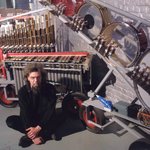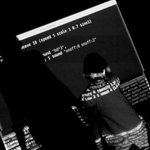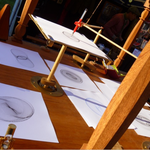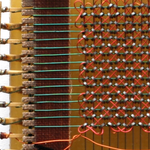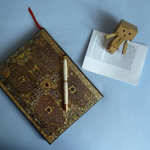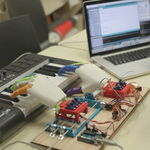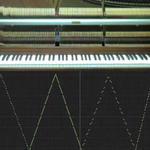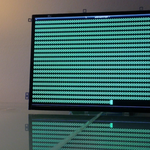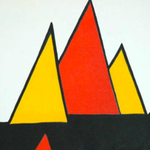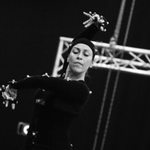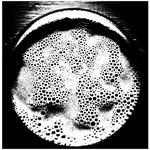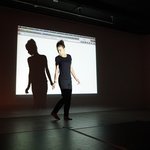

Chaired by Derek Hales Derek Hales is an architect and independent researcher currently affiliated to the Committee for Inordinate Design. Derek’s recent research has been on speculative design; sonic fiction and imaginary hardware; and the pataphysics of Gilles Deleuze’s objectile. He was a co-founder of Huddersfield’s Digital Research Unit and has worked on artistic R&D in abstract culture since 1995. Jamie Brassett: Speculative Machines and Technical Mentalities ‘Beyond their instrumental functions', writes Rivka Oxman in an article about design, creativity and innovation (2013), ‘advanced digital and computational environments are also becoming tools for thinking design’. At the leading edge of creativity and innovation design does not only speculate the plausible, possible or potential, but pragmatically inserts such futures into the present (as Whitehead says any ‘immediate existence’ (1962) must). Using concepts mainly from Deleuze, Guattari, Spinoza and Simondon, I will position such design speculation as pragmatic, divergent, complex and emergent. That is, as manifesting the technical mentalities (Simondon) that provide the milieu in which we can show what we ‘might be capable of’ (Stengers). Jamie Brassett is Reader in Philosophy, Design and Innovation at Central Saint Martins – where he’s worked since 1995 – and has been Subject Leader and MA Course Leader of Innovation Management since 2008. He is a Visiting Professor in the Design Department of Anhalt University of Applied Sciences (Dessau, Germany). Jamie holds Fellowships of the Royal Society of the Arts (since 2000) and the Higher Education Academy (since 2011). He has a PhD in Philosophy from University of Warwick (1993). Jamie has been publishing philosophical work since 1991 and has spoken nationally and internationally at conferences since 1989; Deleuze and Design (Edinburgh University Press) co-edited with Betti Marenko, was published in June 2015 as part of their ‘Deleuze Connections’ Series. Andrew Hugill: Imaginary Technologies of Music Imaginary technologies of music are a recurring theme throughout literature, from the anticipatory music studio of Francis Bacon's 'New Atlantis' to the temperature controlled orchestrion of Raymond Roussel's 'Impressions of Africa'. These are frequently the creations of imaginary composers, who have an equally illustrious history that includes Proust's Vinteuil, Balzac's Gambara, Powell's Hugh Moreland, and many more. Pataphysics is the "science of imaginary solutions" (Alfred Jarry, The Exploits and Opinions of Doctor Faustroll, pataphysician). In this presentatioin, I will examine the pataphysics of speculative hardware and fictive materialities in the musical domain. How may such meta-meta fictions lead us to exceptional insights? Professor Andrew Hugill is a Composer, Musicologist, Computer Scientist, Literary Scholar and Pataphysician. Andrew is Director of the Centre of Creative Computing at Bath Spa University Maya Oppenheimer: Obedience and Dramaturgical Devices Stanley Milgram’s Obedience research is widely cited and superficially understood as providing ‘objective’ laboratory evidence that human subjects are willing to inflict harm on another individual if ordered to do so by a present authority. However, by starting with a critical reading of the interfaces of this experiment via the infamous simulated shock generator, Milgram’s work assumes a different inflection. A deft performance piece that relies upon the affordance of bespoke, designed devices, dramaturgical import runs through this work as well as Milgram’s other research projects. From obedience, conformity, to the small-world phenomenon, this paper considers the design and agency of mechanical movements and algorithmic elements in experiment scenarios that affect our understanding of human subjects as social agents. Maya Oppenheimer is a design writer, researcher and educator. Her work focuses on the influence of tools, instruments and methodologies on experimental outcomes in behaviour studies and design as well as pedagogy and design criticism. She teaches at the Royal College of Art and is a Trustee of the Design History Society. Spencer Roberts: Algo-Mech: Algo(rhythms) and mech(animisms). The concepts of the algorithmic and the mechanical express a set of common processual concerns whilst cutting idiosyncratically across ideal and material planes. As descriptors of internal and external influence, the notions of the relational and the parametric are implicated in the genesis and transformation of twenty first century life. What then, are the qualities of the contemporary city symphony? Is it the algo(rhythm) and the mech(animism) that serve primarily to sonify the everyday? This talk will examine the contemporary interest in process-philosophical notions of rhythm, relation and parameter in the context of making - exploring the ways in which such ideas are reflected, refracted and contorted in both hacktivist and institutional contexts. Spencer Roberts is based at the University of Huddersfield, where he teaches art, design and animation theory. He also teaches computer programming and physical computing to students in the visual arts. He is interested in the process of writing as a mode of corporeal textual production and in practices of physical computing as material forms of expression. His thesis examined Deleuzian, process-philosophical perspectives on artistic-research, and contested the broadly representational character of an earlier design-led critique.
Derek Hales: Speculative Hardware and Fictive Materialities Derek Hales will host and introduce this panel expanding on recent research on speculative hardware. The panel will discuss a methodological interest in 'fictioning' design, and the consequences of imagining fictive materialities. It develops from a philosophical interest in the speculative, which is to say that it approaches a pataphysical realm of imaginary solutions by pairing the notion of fictive materialities with technical mentalities. Papers range from the philosophy of speculative mechanics to the reconstructive archaeology of fictive materialities; from the pataphysics of literary and imagined musical machines to the materialities of dramaturgical devices the panel will question our obedience to the algo(rythmic) and the mech(animist)Appearing at:
An arts-research day symposium, with talks and performances on the theme of Algorithmic and Mechanical Movement, chaired by Thor Magnusson and Chris Kiefer from University of Sussex's Experimental Music Technology Lab, and taking place in the Sheffield Institute of Arts.
The £25 / £12.50 ticket prices are inclusive of all fees, and includes refreshments, lunch and free access to evening performances at the Millennium Gallery.
We are very happy to announce that the symposium will include a keynote speech by Godfried-Willem Raes from the Logos Foundation. For details, including a draft programme, please see the symposium website hosted by the symposium chairs.
